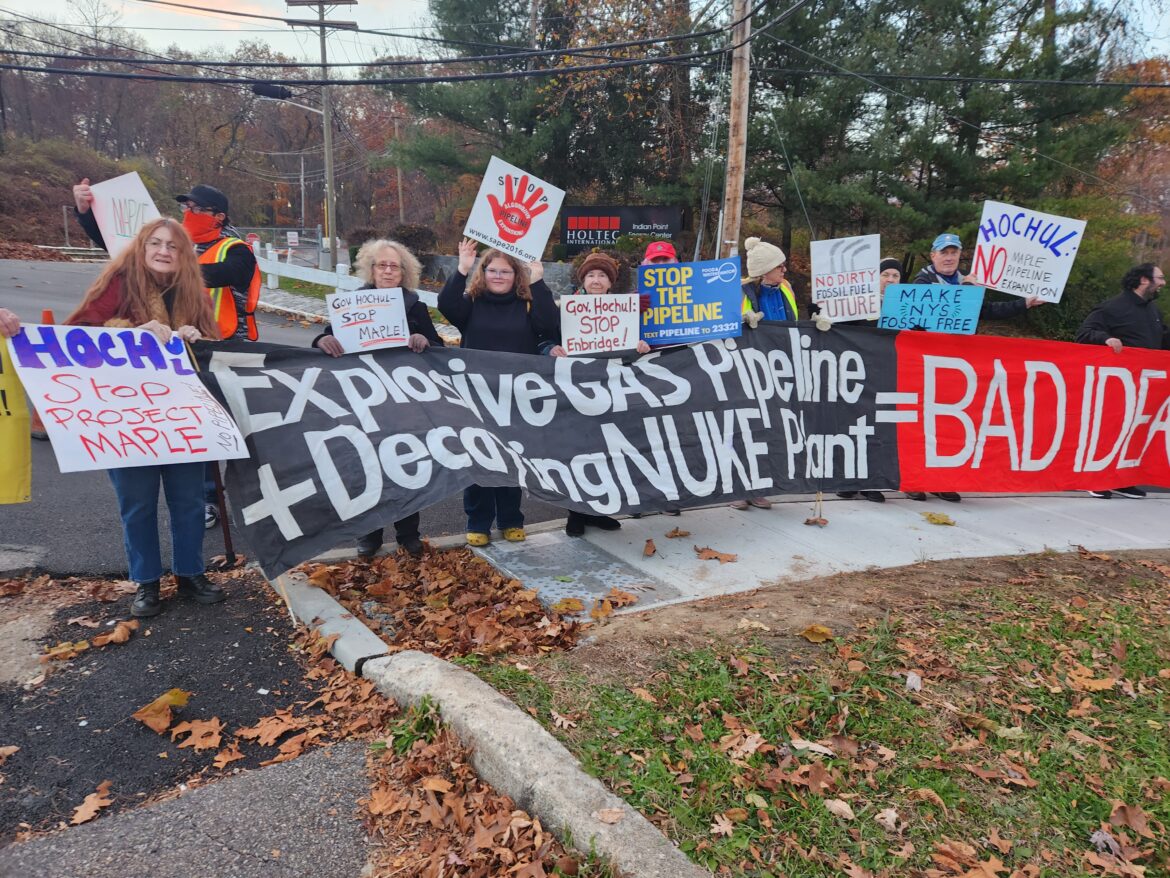Environmental groups see the expansion project as a step backward in honoring the state’s landmark 2019 climate law, which seeks to move away from fossil fuels and guarantee that 70 percent of New York’s electricity comes from renewable energy sources by 2030.

Courtesy Courtney Williams
Activists in Peekskill, NY rallying against the pipeline expansion.Over 90 environmental groups sent a letter Tuesday to Gov. Kathy Hochul and elected officials across New England, urging them to take a stand against the expansion of the more than 1,000 mile-long Algonquin fracked-gas pipeline, which runs from New Jersey to Massachusetts.
Dubbed “Project Maple” by Enbridge, the Canadian fossil fuel company that owns the pipeline, the proposed expansion is still in the early stages of development and would tentatively replace existing pipes for bigger ones so that more gas could flow through.
Environmental groups see the expansion project as a step backward in honoring the state’s landmark 2019 climate law, which seeks to move away from fossil fuels and guarantee that 70 percent of New York’s electricity comes from renewable energy sources by 2030.
“We cannot achieve the goals of our climate law if we continue to expand fossil fuel infrastructure. And we really need Gov. Hochul to take that law seriously,” said Santosh Nandabalan, a senior organizer at Food & Water Watch, one of the organizations that issued the letter.
The Federal Energy Regulatory Commission (FERC) regulates the transmission of natural gas across the country and has the ultimate say on a pipeline project like this one. But local governments could refuse to give Enbridge certain permits it will need at the state level to stop a potential expansion from happening.
“Project Maple isn’t fully formed yet, we would have to wait and see what specific state permits would be required. But there have certainly been instances in the past when states have been able to use their permitting authority for natural gas projects, to stop them from moving forward,” said Erin Doran, a senior attorney at Food & Water Watch.
Enbridge recently took one of the first steps in building out its proposal by holding an open call—that kicked off on Sept. 12 and ended on Nov. 17—for corporations to sign up and show interest in consuming the new gas service the expansion would bring.
“Project Maple will provide New England with an opportunity to secure a cost effective, regionally produced, environmentally responsible source of clean-burning natural gas to support the current and future demand for energy,” the company said in its announcement.
But environmental groups say fracked gas produces one of the highest carbon footprints of all energy types. It is made up of the climate pollutant methane, which traps about 86 times more heat in the atmosphere than carbon dioxide, according to Food & Water Watch.
The expansion would increase the capacity of Enbridge’s pipeline by up to 500,000 Dekatherms per day at one of the points that receives natural gas for transmission in New York, and up to and up to 250,000 Dekatherms per day in Salem, Massachusetts, according to the company. Dekatherms is a unit used to measure the amount of gas that can be withdrawn from a facility, and is equivalent to about one thousand cubic feet. The entire pipeline currently produces 3.09 billion cubic feet of gas per day.
Enbridge did not immediately respond to City Limits’ request for comment on Tuesday’s letter. Hochul’s office referred questions to the state’s Department of Environmental Conservation. A DEC spokesperson said there are currently no permits pending for the project, but that it would evaluate any future applications based on a number of factors, including standards related to the state’s climate law.*
Members of the community who live alongside the pipeline say they live in fear of accidents, such as leaky pipes leading to explosions. Earlier this month, a gas line exploded in the town of Wappingers Falls in upstate New York, leaving 15 people injured. Central Hudson Gas & Electric told CNN that the rupture occurred during routine maintenance.
Algonquin’s pipeline infrastructure, which includes three pipes of varying sizes, runs underneath the shuttered Indian Point nuclear plant in Peekskill, about 50 miles north of New York City.* The defunct facility still houses over 2,000 tons of irradiated fuel rods in addition to other radioactive waste, according to Food & Water Watch.
Courtney Williams, a cancer researcher who has been advocating around environmental issues at Indian Point for over a decade, says the Algonquin pipeline passes 400 feet from a nearby elementary school.
“We need all of these governors to come out strong,” Williams said. “Make clear to Enbridge that this kind of infrastructure is not safe for the communities in those states, it’s not safe for our planet, and that there will be strong opposition at all levels of government to these expansions.”
Local lawmakers have also joined the opposition. “I think we have to stop expansion of fossil fuel infrastructure, and focus on expanding clean energy, clean, sustainable energy system solutions,” State Assemblywoman Dana Levenberg, whose district includes Peekskill, told City Limits.
“Part of protecting our environment is not to allow these types of build outs to continue to occur and to have legs, and try to nip them in the bud early on, instead of letting them get so far down the line that then it makes it very difficult to stop,” she added.
Sen. Peter Harckham, who chairs the State Senate’s Committee on Environmental Conservation, echoed that sentiment.
“Our focus needs to be on investing in climate friendly alternatives such as hydro, solar and wind,” he said. “Investments to increase fossil fuel consumption are contrary to that policy.”
*Editor’s note: This story has been updated to correct the number of pipes in the Algonquin pipeline, and to include comment from the state DEC.
To reach the reporter behind this story, contact Mariana@citylimits.org. To reach the editor, contact Jeanmarie@citylimits.org








